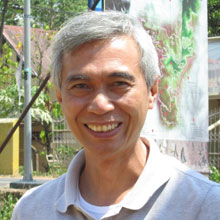
Bambang SURYOBROTO
Lecturer, Bogor Agricultural University, Republic of IndonesiaLife sciences necessitate comparative approach that leads researchers to study a number of closely related species. However, even if they are related, various species are distributed across different countries. This is exactly the fact of what we call the modern aspect of science: international network. I therefore belief in that early on their career students should be exposed to international scientific community. This will not only broaden their perspective but also to give them grounds to discover universal law of nature.
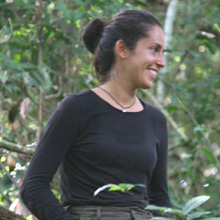
Kimberley J. HOCKINGS
University of ExeterUnderstanding the complexities of human-wildlife interactions is vital for sustainable coexistence
With the large-scale conversion of natural habitats to alternative land-uses, wildlife populations are increasingly exposed to humans and their activities. A growing need to conserve wildlife that live in proximity to people demands cross-disciplinary research to understand social and behavioural dimensions of human-wildlife interactions. I have a particular interest in great ape flexibility, especially how individuals adapt their complex lives to exploit anthropogenic habitat, and the drivers of resource competition and aggressive interactions between humans and wild chimpanzees. I conduct fieldwork at research sites in Guinea and Guinea-Bissau, West Africa.
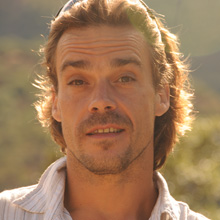
Nicolas GRANIER
Behavioral Biology Unit, University of Liege, BelgiumResearch and Conservation - Enhancing knowledge to improve preservation
My research on the behavioral ecology of non habituated chimpanzees populating the Nimba Mountain offers strong views on conservation. The rugged Nimba Mountain stretches out at the tri-national border between Guinea, Cote da??Ivoire and Liberia, exhibiting an outstandingly rich and endemic wildlife. Fascinated by the exceptional landscape and biodiversity, I rapidly became aware of the importance and pertinence of ecosystem-based approaches in research and conservation. I today favor such multidisciplinary and holistic research integrating faunal, floral and anthropological aspects (but also development, politics and economics), to achieve faithful knowledge making for efficient and purpose-built in situ conservation.
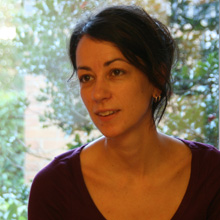
Dora BIRO
Associate Professor of Animal Behaviour, University of Oxford, UKInteractions between individuals are key to shaping societies
Living in groups presents both challenges and opportunities. On the one hand, groups can be pulled in different directions by their membersa?≫differing opinions and preferences. Resolving such conflicts may incur costs for those members who compromise on their preferences in the process. On the other hand, groups can harbour a large pool of varied and useful information. Thus, decisions that members make together can be highly accurate, and knowledge and skills can be passed on from generation to generation. I study such group-level phenomena through exploring individualsa?≫interactions in both bird and primate systems, with a view to pinpointing general organizational principles that have interesting parallels in human society.
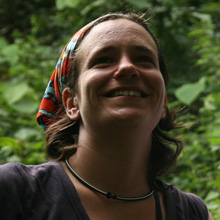
Tatyana HUMLE
Durrell Institute of Conservation and Ecology, School of Anthropology and Conservation, University of Kent, Canterbury UKPromoting understanding and sharing knowledge
My research focuses on adopting an interdisciplinary approach to understand patterns of interaction and co-existence between wildlife and people, especially among great apes, with the aim to help balance conservation and development objectives and inform policy. I also nourish a keen interest in the conservation and welfare dimensions of primate rehabilitation and reintroduction. Since 1995, my research has primarily focused on chimpanzees in West Africa, especially at Bossou, the Nimba Mountains and the High Niger National Park in Guinea. I am also a member of the Primate Specialist Group of the IUCN and the Section on Great Apes and the scientific commission of GRASP/UNEP.
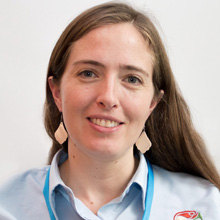
Laura MARTINEZ
The National Commission of Natural Protected Areas, MexicoScientists need to dialogue with other sectors of the society to make a change
Studying baboons, chimpanzees, orangutans and red colobus, made me fulfill my childhood dream: to become a primatologist. My field experience in West Africa and experimental training in Japan both strengthened my conviction that a multi-faceted education and interdisciplinary knowledge are necessary to understand our complex world. To tackle threats that face wildlife, I am convinced that we need to tight up links between academia and the sectors that have the most direct impact on our environment: governments, private companies and international agencies.
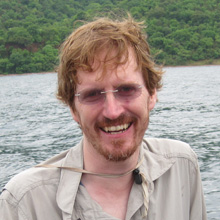
Alexander Weiss
The University of EdinburghHe who understands baboon would do more towards metaphysics than Locke. (© Darwin 1838: Notebook M)
Individual differences in behavioral and emotional tendencies, and in mental abilities, are everywhere in the natural world. Charles Darwin viewed these differences as the 'fuel' of evolution. I have been studying these differences for over 15 years in great apes, other nonhuman primates, and even in humans. Understanding the genetic and developmental origins of these differences, how they differ across species, and how they impact lives is not only crucial for understanding primate behavioral evolution, but also critical if we want to enhance captive animal welfare and preserve biodiversity.
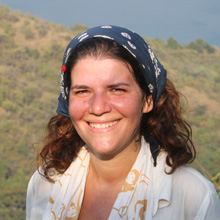
Susana Carvalho
Associate Professor, the University of OxfordWalking the interdisciplinary trails of science: From evolution to conservation
'In the long history of humankind and animal kind, those who learned to collaborate and improvise most effectively have prevailed' (Darwin). I believe that research expands knowledge through bridging natural and social sciences. What can ethology contribute to constructing referential models of human technological behavior and what can archaeology contribute to improve knowledge about extant tool-using primates? I study chimpanzee tool-use to model technology-related behavior in early humans. I am also focused in devising novel methods of data collection that minimize primate disturbance and increase the accuracy of data.

Marine Leve
Department of Ecology, Physiology and Ethology, Strasbourg University, FranceAfter having discovered the chimpanzees in the Bossou community, my interest in primate societies, ecology and behavior is still growing. I am studying the association patterns from the dyadic level to the level of the community, using Social Networks Analysis tools. Primate societies and their organization are complex, and vary quite a lot (from hierarchical societies to quite egalitarian ones; from large to smaller groups; etc.). I use the SNA framework to have an insight into the function and structure of the relationships; and link these to an ecological and evolutionary perspective.
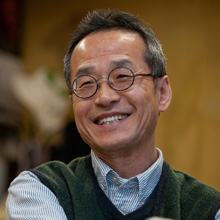
Jae C. Choe
Director, National Institute of Ecology and Distinguished Professor of EcoScience, Ewha Womans University, KoreaI received my PhD in evolutionary biology from Harvard University and taught at Harvard University, the University of Michigan, Seoul National University, and Ewha Womans University. Since November 2013 I serve as the founding director of a newly established National Institute of Ecology in Korea. In 2013 I also established The Biodiversity Foundation with Jane Goodall. My research addresses the questions of behavior, ecology, and cognitive evolution of social insects, magpies and primates. More specifically, I investigate sexual selection and social evolution in Zoraptera, social conflict among colony-founding queens of Aztec ants, behavior and ecology of Black-billed Magpies, and mating system, vocal communication and cognitive ecology of Javan gibbons.

Emmanuelle Grundmann
My fascination for animal behaviour and nature in general has its roots in the books and documentaries of my childhood. Later, the field studies I conducted in Borneo and the threats the orangutans were facing led me to the intimate conviction that you protect what you know. Therefore, in writing books or giving conferences on the wildlife living on our doorstep but also at the antipodes, I'm hoping to contribute to a better cohabitation between human and nature. A cohabitation such as the one you can experience in Japan, where nature is deeply anchored in the everyday life, in arts and in science.

Camille PENE
Ecole Nationale Veterinaire de ToulouseI am a vet student in Toulouse, France, and I will graduate next year. I was introduced to primatology through internships in France (Strasbourg) and Japan (PRI, Inuyama). I studied enrichment for captive rhesus monkeys and color vision in chimpanzees. Those first steps in primatology field convinced me to continue this way after finishing vet school. I am particularly interested in writing skills (giving a signification to an abstract form in order to transmit a message to a third party) and self-medication in the wild. I intend to study ethology and primatology while working as a veterinarian.
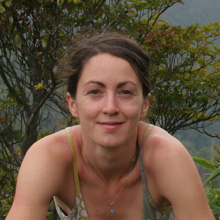
Catherine Hobaiter
University of St AndrewsCommunicating without words; studying great ape behaviour gives us a window to their minds and our own.
I study the evolution of communication and social behaviour, particularly through long-term studies of wild chimpanzees. My work has focused on gestural communication in the chimpanzees of the Budongo forest in Uganda. We have extended this to look at communication across communities in East and West Africa. In addition I study the acquisition and flexibility of social behaviour, comparing and contrasting skills such as food processing and tool-use. Studying the close communicative and behavioural heritage we share with great apes provides a window through which we can stimulate interest in their conservation.
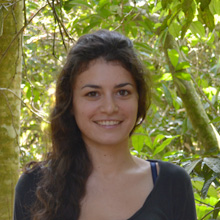
Morgane ALLANIC
Master's degree in Research in Animal Behavior at University Paris 13 ? Villetaneuse - FranceCaptive and wild studies are equally important to understanding animal behavior. After carrying out cognitive studies with captive chimpanzees at the Primate Research Institute, I was inspired to study primates in their natural environment. My research focuses on mother-infant relationships of wild orangutans in Borneo. Orangutans have a long interbirth interval, during which infants are dependent on their mothers to navigate the canopy and choose which foods to eat. I am looking at how the nature of dependency on the mother evolves by focusing on the function of mother-infant contact in different age groups.

Yongcheng Long
Chief Scientist for The Nature Conservancy's China ProgramChief Scientist for The Nature Conservancy's China Program, Director for China Primate Specialist Group, and Regional Vice Chair China for IUCN SSC Primate Specialist Group. I have been studying Yunnan snub-nosed monkey since 1987. During the process, I have been trying his a??all in" to promote China primate conservation awareness building nation widely. Also, I published about 50 journal papers and a few books for academic purposes as well as some publications for public appreciation. I feel honored to be one of the international collaborators for the great initiative of PWS.
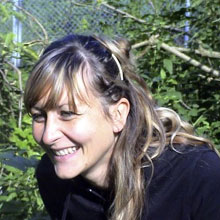
Emilie GENTY
Postdoctoral fellow, Universite de Neuchatel Laboratoire de Cognition Comparee Institut de Biologie, SwitzerlandBecause we imagine that we are what humanity was divinely destined to become, we assume that our prehistoric ancestors were trying to be us, but just lacked the tools and techniques to succeed. (Daniel Quinn)
One way to understand what it is to be human is to look for homologous traits and precursors of shared abilities in our closest living relatives, the non-human primates. Experience has shown that various traits with a long history of being considered uniquely human have progressively turned out to be shared with other species. Language is still widely considered one of the major differences between humans and animals, and understanding its evolutionary origins, by studying the communication systems of non-human primates, is therefore of considerable interest. My current research focuses on ape communication and I am particularly interested in investigating precursors of core abilities crucial for language, such as intentionality, common ground, joint attention, and referentiality.

Yanjie SU
Professor at the Department of Psychology, Peking University, China,Director of the Biological Psychology Laboratory
Dr. Yanjie SU is a Professor at the Department of Psychology, Peking University, China, and Director of the Biological Psychology Laboratory. Her research interests focus on evolution and development, particularly the emergence and development of theory of mind, and the relationship between social behavior, social organization and intelligence. She has studied behavior and comparative cognition in a variety of species of birds and primates, as well as children. Dr. Su's research has been widely published in Chinese and international journals, including Developmental Psychology, AJP and IJP. She serves as Associate Editor of "Acta Psychologica Sinica" and "Acta Theriological Sinica", and General Secretary of the Beijing Association of Psychology.
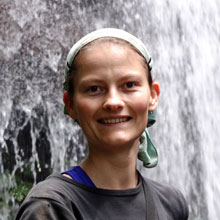
Kathelijne Koops
Post-doctoral Researcher, Department of Archaeology & Anthropology, University of Cambridge (UK)Ape technology: our closest living relatives provide a window into our evolutionary past
My research focuses on the use of technology by wild chimpanzees and bonobos. Since 2003, I have been studying the chimpanzees at the Seringbara study site in the Nimba Mountains in Guinea, West Africa. Recently, I have included both East African chimpanzees and bonobos in an intra- and inter-species comparison of ape technology. I seek to illuminate the roles of the environment, sociality and cognition in shaping the use of technology by our closest living relatives, in order to understand the processes that drive the origins and evolution of human material culture. Increasing the awareness of our close evolutionary links with the African apes provides us with the tools to promote the conservation of our endangered cousins.

Boniface B. KAYANG
Senior Lecturer, Department of Animal Science, University of GhanaPromoting wildlife conservation through strategic improvement in native livestock genetic resources
In many developing countries such as Ghana, wildlife abundance and diversity are continuously declining mainly through reduction in original habitat and hunting pressure. Native livestock breeds are also disappearing because farmers prefer more productive exotic breeds to satisfy the demands of an ever increasing population. Thus, in conjunction with wildlife conservation, it is essential to enhance the productivity and sustainably utilize selected native livestock genetic resources to ensure food security. My research approach employs genetic analyses to improve local chickens and guinea fowls and also to facilitate the domestication and breeding of grasscutters, which top the list of hunted wildlife. Making these livestock species more readily available as alternative protein source to replace bushmeat will curb hunting and overharvesting of wildlife, which often employ techniques such as bushfires that are detrimental to biodiversity and the environment, and this will greatly contribute to wildlife conservation.

Anna-Katharina Laboissiere
Department of Philosophy, Ecole Normale Superieure, ParisCompanion species and entanglements
Not a single living being on this planet exists alone or unconnected?; individuals of all species are always inserted into vast and complex biological and social ecosystems. As a philosophy student, I am interested in the way interactions with other-than-human beings shape us, and them in return. Humans, due to their almost unlimited power to impact and exploit their environment, all too often forget about their entanglements with companion species?; I believe that to remember them, and act upon them in a respectful and enriching way, is a responsibility that needs to be taught widely and shouldered by all those who study and work with nonhuman animals.

William C. McGrew
Emeritus Professor of Evolutionary Primatology, Department of Archaeology and Anthropology, University of CambridgeField primatology necessarily involves conservation, and good conservation is built on good science. This is a truism, but not so many academic institutions do both well. I've studied the ethology and ecology of wild chimpanzees for 40+ years, from Senegal to Tanzania and lots of points in between. At every site, researchers were involved in protecting and preserving our subjects of study. This meant situating the apes in their total context of biodiversity of other animals and plants and acting accordingly. Future generations of researchers will have to do the same.
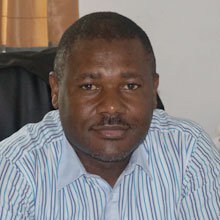
Alfred NGOMANDA
Ma Recherche à l'IRET: Mieux caractériser la biodiversité des forêts denses humides africaines pour mieux les gérerDr Alfred Ngomanda est Directeur de l'Institut de Recherche en Ecologie tropicale (IRET), l'un des cinq institut du Centre National de la Recherche Scientifique et Technologique (CENAREST) du Gabon dont la recherche est focalisée sur l'étude de la biodiversité forestière. Ses activités de recherche portent sur les changements globaux (passé, présent et futur) et leurs effets sur les forêts du bassin du Congo, une des thématiques prioritaires développée au sein de l'IRET. Elles ont pour but de mieux caractériser la biodiversité des forêts denses humides africaines pour mieux les gérer.

Shahrul Anuar Mohd SAH
Animal Diversity and Diversity in Life: A Journey to Discovery
I'm broadly trained as field ecologist in the study of animal ecology and animal social organisation. The long term goal of my research is to understand the effects of forest conversion from natural forest landscape to man-made and altered habitat which in turn affected its wildlife diversity. Habitat changes would cause several negative implications such as direct reduction of resident species, disruption of normal behaviour and activities, changes in species composition and foraging activities. My work has focussed on various group of animal: small mammals, bats, birds, sea turtles, reptiles and amphibians. Throughout the years, my work with graduates from many countries contributed tremendously not just in science but also in strengthening transnational co-operation and in understanding the diversity of human cultures and their living environment. Finally, it is my greatest pleasure to share knowledge's and experiences to members and graduates of the PWS program.
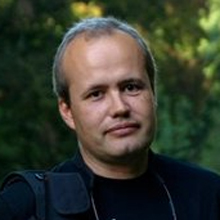
Maciej Trojan
Head of Department of Ethology and Comparative Psychology, Institute of Psychology, Nicolaus Copernicus University
My research fits into current trend of cognitive ethology and comparative psychology. I am interested in the evolution and functions of the mind. As a team, we work mainly on the theory of mind in animals, mental time travels, memory, numerical competences, social learning, the sense of equity and pro-social behavior in animals and lateralization of the brain and its impact on behavior. Our research are conducted on different species living in our laboratory, Warsaw zoo (including primates) and also in natural environment.
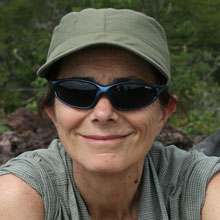
Elisabetta Visalberghi
Research Director, Unit of Cognitive Primatology, Istituto di Scienze e Tecnologie del Consiglio Nazionale delle Ricerche
No doubt the world is in big troubles. A fully rational approach, based on what has been (and is) going on around us, leads to pessimism. However, I think we have the duty (and the pleasure) to be optimistic. Why? Because having a goal makes the difference: it means to have something to care about, values to defend and something important to pursue. This gives strength to each of us, and the more we are sharing this view the more chances we have to save our world. I happened to be in love with nature since I was a kid, I chose to become an ethologist to be happier, and I want others to have the same opportunities I had.

Christopher Flynn Martin
Postdoctoral Research Associate, Indianapolis ZooAn academically rigorous and adventurous education
When I started studying comparative cognitive science with chimpanzees at Kyoto University, it wasn’t long before I felt at home in Japan conducting daily computer task experiments and developing new touch-panel research methods. But this was not the only focus of the program. I was also encouraged to go observe wild chimpanzees in Africa, and orangutans in Borneo. Traveling to see great apes in their natural habitats enhanced my approach to studying their social cognition in lab and zoo settings. Exposure to both field and laboratory primatology promotes a well-rounded educational experience.
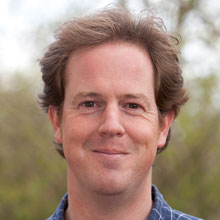
Rob OGDEN
Programme Director・TRACE Wildlife Forensics NetworkOur ability to investigate and understand genetic diversity has revolutionised many aspects of biological science, including wildlife conservation. Throughout my research career I have worked as a population geneticist, focusing on the development and application of genetic tools to conservation management and wildlife law enforcement (DNA forensics). This has included studies on the genetic management of captive breeding programmes, reintroductions and small populations in the wild. The advent of high-throughput DNA sequencing has now opened up the possibility of exploring adaptive differences at the level of the genome, providing new opportunities and insights into how best to conserve biodiversity.

Patrícia Izar
Professor Doctor at Experimental Psychology Department, University of São Paulo, BrazilI am interested in understanding factors related to primate behavioral flexibility, such as the relationship between mother and infant, and ecological context in different developmental phases. The Neotropical tufted capuchin monkeys provide a good model for that: they have a long period of immaturity during which they acquire a great part of their behavior, including tool use in some populations; and they are able to live in very different biomes, from evergreen forests to the semi-arid. In my research I compare several wild populations that are increasingly threatened by human activities. Acting for conservation is essential to understand these incredible monkeys.
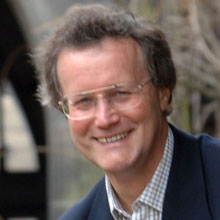
Richard W Byrne
Research Professor, University of St Andrews, ScotlandExplore the nature of the ‘precursor' abilities that allowed the evolution of uniquely human traits
The human mind is much too elaborate and intricate to have evolved suddenly in the last few million years: by studying the behavioural abilities of our close primate relatives and convergent abilities in distantly related species, we can explore the nature of the ‘precursor’ abilities that allowed the evolution of uniquely human traits such as language and technology. My group’s studies of gesture in great apes have revealed a rich, biologically-based communication system with extensive sharing of gestures between species, yet used in an intentional way that is sensitive to the attention and knowledge of the audience. Our work on foraging has shown that monkey travel decisions take into account past memories of food location and quality, the effect of weather on the timing of ripening, and future plans that avoid competition. Our work on the manual abilities of great apes in plant preparation has revealed that multi-stage, bimanually-coordinated plans are acquired even in non-tool feeding tasks, helping to illuminate what is ‘special’ in great ape tool use. And our work with the African elephant has found remarkably ‘ape like’ abilities, in a mammal not sharing a common ancestor with apes for at least 105 Mya: in understanding and using pointing gestures, in updating a working memory of companions’ locations, and in sophisticated categorization of different human groups.
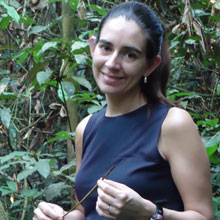
Crickette Sanz
Washington University and the Wildlife Conservation SocietyFew pristine places remain on this planet and it is our collective responsibility to preserve them. I have the privilege of working in such a place -- the Goualougo Triangle in northern Republic of Congo, which is considered a stronghold for ape conservation. The broader Ndoki landscape is comprised of both protected areas and active logging concessions. To ensure the long-term survival of chimpanzees and gorillas, aspiring primatologists must understand the environmental and socioeconomic importance of both situations. My role in the PWS is to encourage students to achieve excellence in both science and stewardship.
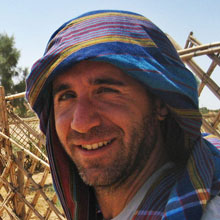
Luca MORINO
JSPS research fellowAfter working on wild, endangered primates in the forests of Southeast Asia and Kenya, I fully realize the complexity of the challenges faced by those natural habitats. At present, in addition to my research on captive and wild apes, I am involved in projects promoting education, conservation and sustainable development in Africa and Indonesia. I consider the PWS graduate program an excellent resource to train a new breed of scientists, aware of the many perspectives and interests involved in understanding and conserving nature today, and able to find novel solutions to such challenges.

Cecile GARCIA
Permanent Researcher, CNRS (The National Center for Scientific Research) Department of Evolutionary Anthropology
Your task is not to foresee the future, but to enable it
(Antoine de Saint-Exupery, Citadelle, 1948)
My research interests focus on the evolution of mating and social systems in humans and non-human primates. My research combines behavioural and ecological data with endocrinological analysis to examine the evolution of life-history traits, reproductive strategies, and sexual signaling in natural and captive populations of Japanese macaques, olive baboons and brown lemurs. I strongly believe that such an integrative approach is a key to better understand and conserve wildlife.
Through the PWS leading program, we aim to train a new generation of scientists who will be prepared to use a holistic approach in wildlife science in their future work on biodiversity conservation, human-animal interaction, education and sustainable development.
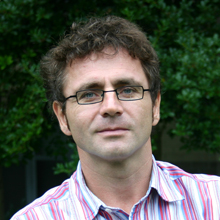
Jef Dupain
Director, African Apes Initiative, African Wildlife Foundation
In 1994 and 2000, I started the Bonobo in Situ project in the Lomako Forest (DRC), and “Projet Grand Singes” in the northern periphery of the Dja Faunal Reserve (Cameroun). These small scale projects focussed on great ape conservation in non-protected areas, in collaboration with the local communities. In 2004-2011, I develop and implement the African Wildlife Foundation’s (AWF) Congo Heartland program around the Lomako forest aiming to bring ecological, social and economic sustainability to the landscape through participative land-use planning. I know manage AWF’s African Apes Initiative which focuses on protecting great apes in both protected and non-protected areas and allows AWF to share its conservation expertise with fellow great ape conservationists throughout the continent.
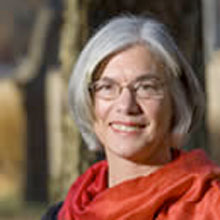
Dorothy Fragaszy
Professor and Chair, Behavioral and Brain Sciences Program, Psychology Department, University of Georgia
Studying animals as a profession is a source of joy and a tremendous privilege. With this privilege come the linked duties to work for the protection and nurturance of the natural world, and to inspire others to do the same. I am honored to be an International Collaborator of the PWS program at Kyoto University, to join other like-minded scientists in this important endeavor. I study how individuals become competent and productive members of their communities, focusing on foraging and problem-solving behaviors of nonhuman primates, particularly New World monkeys. I hope to encourage the next generation of behavioral scientists to think broadly about the natural world and how they can study it.
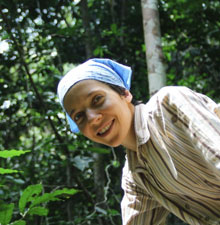
Cintia Judit GARAI
Filmjungle.eu ProductionsIf we make the effort to understand Mother Nature, then we will come to love her, and will want others to come to understand and love her as we do.
In the world today, where nonhuman primates, along with their habitat, are disappearing, we cannot afford to study them without also considering their future. PWS provides a unique opportunity to those who want to better understand and protect primates and the environment in which they live. I found support in the PWS program for my endeavours; I combined filmmaking, conservation and research. Following my experience, I would invite anyone who aims to do something concrete and meaningful for primate conservation and research to join this program in order to realize your dreams, put your ideas into action; to contribute.

Sanae Okamoto-Barth
Director for Asian Affairs, University Industry Innovation Network (UIIN), the Netherlands;Research Associate, Department of Cognitive Neuroscience, Faculty of Psychology and Neuroscience, Maastricht University, the Netherlands
After completing research projects focused on social skills in chimpanzees and humans in Japan, Germany, and the US, I studied the neural basis of human altruism and economic decision-making at Maastricht University. My academic experience in multiple fields and countries as well as a field stay in Bossou, Guinea, has ultimately led me to explore the potential role of higher education in the future. At UIIN, I am currently working on programs that foster triple-helix networks between universities, policy makers, and enterprises in Asian universities. I strongly believe that we need a new generation of researchers who will direct their efforts towards addressing today’s global challenges including wildlife conservation.
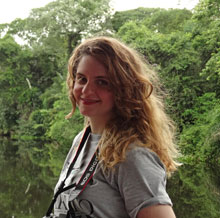
Gabriela Bezerra de Melo Daly
École Normale Supérieure, Laboratory of Social Anthropology (Collège de France)Bridging the gap between sociocultural anthropology and primatology
I am a sociocultural anthropologist interested in developing methodological and theoretical interfaces between primatology and sociocultural anthropology, since both areas are still far from achieving the promising results that full collaboration could potentially bring. I am particularly interested in Japanese primatology, due to its pioneering place in shaking the so-called “great divide” between humans and nonhuman animals. This has led me to carry out an etho-ethnographical study of human-chimpanzee interaction in a laboratory setting at the Kyoto University Primate Research Institute. In the same laboratory, I was given the opportunity to conduct cognitive experiments with chimpanzees on object and color categorization, together with Tetsuro Matsuzawa and Misato Hayashi. My experience at PRI taught me how to approach research from a primatological perspective, and because categorization is one of the most fundamental features of human cultures, I have been able so far to bridge our ongoing research and my original field. Now, my next step is to discover wild chimpanzee populations.
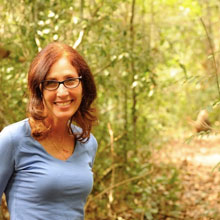
Karen B. Strier
Vilas Research Professor & Irven DeVore ProfessorDepartment of Anthropology
University of Wisconsin-Madison
President of the International Society of Primatology, 2016-2020
Behavioral flexibility may hold the keys to primate survival in a rapidly changing world
My main research interests are to understand the behavioral ecology of primates from a comparative perspective and to apply this understanding toward the conservation and management of endangered species and their habitats. My perspectives have been shaped by my long-term field studies of the northern muriqui (Brachyteles hypoxanthus), which I have been studying in Brazil's Atlantic forest since 1982. The northern muriqui is the most peaceful primate in the world, and therefore offers glimpses into a way of life very different from our own. The muriqui is also a critically endangered primate that has nonetheless shown remarkable resilience. One of the priorities of my long-term field study is to document how stochastic demographic fluctuations, variation in individual life histories, and behavioral and ecological flexibility interact to affect population persistence. We are finding that in at least some cases, behavioral flexibility may hold the keys to primate survival in a rapidly changing world.
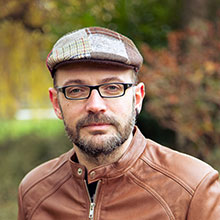
Cédric Sueur
Associate Professor, University of StrasbourgUnderstanding the structure of animal social network as well as its coevolution with socioecological pressures.
Cédric Sueur is Professor at the University of Strasbourg since 2011. He is mainly working on animal behaviour and specifically on social networking and decision-making in animal groups at the Institut Pluridisciplinaire Hubert Curien. He is particularly interested in the co-evolution of social network topology and social transmission of information and pathogens, as well in humans, non-human primates, ungulates and insects. These diverse models are a way to show universal rules of sociality. He got the Young Scientist Award from the French Society for the Study of Animal Behaviour in 2013, the Primates Social Impact Award in 2017 and the Adolphe Wetrems award in 2019 from the Royal Academies for Science and the Arts of Belgium. He is also fellow of the University of Strasbourg - Institute for Advanced Study and junior member of the Academic Institute of France (http://www.iufrance.fr).
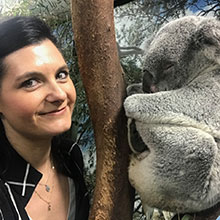
Rebecca Johnson
Director, Australian Museum Research InstituteBiodiversity conservation through applied genomics and wildlife forensic science
A strong focus of mine is how we can use science to make a difference in understanding and conserving our natural world. This is increasingly important as we fully realise the impacts on our environment due to anthropogenic driven change. Through my work in conservation genomics and wildlife forensic science I am applying modern genetic and genomic techniques to minimise and hopefully reverse those impacts.
The koala genome is one such success story of international scientific collaboration that provided a deep genomic insight into this threatened species, their life history and best practise for future conservation. Through my work in wildlife forensic science, we have established linkages with Australian government and industry as well as other international laboratories so we can work together to use science to understand, investigate and reduce the illegal wildlife trade.
Another of my passions is communicating the importance (and fun!) of science in biodiversity conservation. I like to teach all audiences, especially school students, that everyone can make a difference through their actions, however small they might seem.